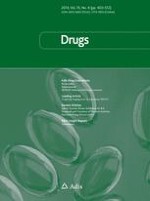01-12-2005 | Adis Drug Evaluation
Docetaxel
A Review of its Use in Metastatic Breast Cancer
Published in: Drugs | Issue 17/2005
Login to get accessSummary
Abstract
Docetaxel (Taxotere®), a cytotoxic taxane, is an antimicrotubule agent effective in the treatment of patients with breast cancer. The clinical profile of docetaxel as an effective cytotoxic agent in the treatment of metastatic breast cancer is well established. As yet, no single standard regimen has been identified as optimal for the treatment of patients with metastatic breast cancer after failure of prior chemotherapy. However, the efficacy of docetaxel monotherapy administered every 3 weeks as a 1-hour infusion is similar to or better than that of doxorubicin, paclitaxel and fluorouracil plus vinorelbine, and better than that of methotrexate plus fluorouracil or mitomycin plus vinblastine. Although docetaxel is associated with neutropenia and other adverse events, its overall tolerability profile is generally acceptable in the majority of patients. Docetaxel, therefore, is an effective option in the treatment of patients with metastatic breast cancer after failure of prior chemotherapy.
Pharmacological Properties
Docetaxel is an antimicrotubule agent that principally exerts its cytotoxic activity by promoting and stabilising microtubule assembly while simultaneously preventing microtubule depolymerisation. This results in inhibition of normal cell division. In vitro and in vivo, docetaxel has antineoplastic activity against a wide range of cancer cells, demonstrates synergistic activity with several antineoplastic agents and often has greater cytotoxic activity against human breast cancer cell lines than paclitaxel.
The pharmacokinetics of docetaxel are linear at clinically relevant doses and are consistent with a three-compartment model. Docetaxel is highly bound to plasma proteins, but has a large volume of distribution at steady state. It is primarily metabolised by the cytochrome P450 3A4 isoenzyme and is excreted primarily faecally via the biliary tract. Clearance of the drug is a strong independent predictor of severe haematological toxicity in cancer patients.
Therapeutic Efficacy
In women with metastatic breast cancer previously exposed to anthracyclines or alkylating agents, docetaxel monotherapy was associated with median values for overall survival of 10.4–16.0 months, objective response rate (ORR) of 30.0–47.8% and time to tumour progression (TTP) of 4.4–6.5 months. In head-to-head comparative trials, docetaxel monotherapy was at least as effective (in terms of overall survival time, ORR and TTP) as doxorubicin, paclitaxel and fluorouracil plus vinorelbine, and was more effective than methotrexate plus fluorouracil or mitomycin plus vinblastine. Median values for survival time (15.4 vs 12.7 months), TTP (5.7 vs 3.6 months) and response duration (7.5 vs 4.6 months) were significantly (p ≤ 0.03) longer with docetaxel than with paclitaxel. Differences between docetaxel and comparators in health-related quality-of-life outcomes were generally not significant.
In phase III combination therapy studies, docetaxel combined with doxorubicin or epirubicin resulted in similar overall survival to clinically relevant comparator combinations. Outcomes were similar with docetaxel plus either capecitabine or gemcitabine and the former combination was more effective than docetaxel monotherapy.
Tolerability
While severe adverse events were common, the tolerability of docetaxel in comparative clinical trials was generally acceptable. Severe neutropenia affects most docetaxel recipients, with febrile neutropenia occurring in approximately one-eighth of patients. Dose-cumulative severe fluid retention was reported in 6.5% of docetaxel recipients, despite premedication with prophylactic corticosteroids. Other grade 3 or 4 adverse events include asthenia, stomatitis, infections, neurosensory, cutaneous or gastrointestinal events, nail changes, severe fever in the absence of infection, myalgia and hypersensitivity reactions.
In comparative monotherapy trials, neutropenia generally occurred more often with docetaxel than with comparators, excepting doxorubicin, where the incidence was similar. Other severe haematological, cardiac and gastrointestinal adverse events were less frequent with docetaxel than with doxorubicin. Docetaxel was associated with significantly higher incidences of grade 3 or 4 neutropenia and febrile neutropenia and several non-haematological adverse events than paclitaxel; however, patients in the docetaxel arm received more cycles of therapy than those in the paclitaxel arm (six vs four cycles). Docetaxel tolerability in combination therapy regimens was generally similar to that of comparator drugs, apart from a higher incidence of haematological adverse events.





